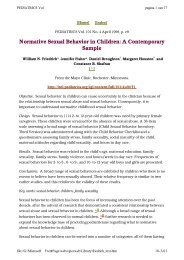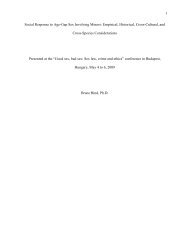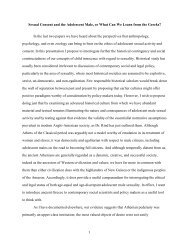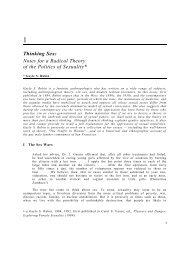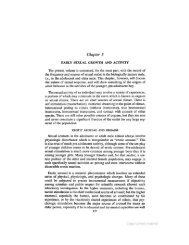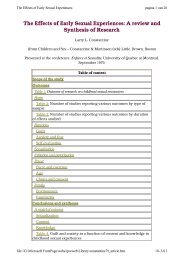PDF file - Ipce
PDF file - Ipce
PDF file - Ipce
Create successful ePaper yourself
Turn your PDF publications into a flip-book with our unique Google optimized e-Paper software.
Part_5_2<br />
likely to be the taunts of the playground bullies. These youngsters especially can greatly benefit<br />
from at least someone in their surroundings giving them positive messages about their desires:<br />
the very last thing they need is to have their bodies kept at arm's length by terribly pure<br />
paragons of virtue who have apparently conquered physical desire. If even a paedophile won't<br />
touch them, what sort of a pariah will the gay youngster feel himself to be?<br />
Incidentally, while what we have come to call Platonic love is plainly a poisoned chalice, the<br />
writings of Plato himself on the subject of love are still worth reading. Plato's Symposium, in<br />
particular, has an extended discussion on love and the proper relationship between a lover and<br />
a loved one, in a context highly relevant to us and to our consideration of what is "good",<br />
because the lovers in question are men and the loved ones are the youths they befriend. But the<br />
discussion needs to be read very critically. The character Pausanias, in his main speech, makes<br />
what may very well be the first recorded put-down of a paedophile by a gay in literature.<br />
Paedophilia and homosexuality are of course modern social constructions and some of the<br />
arguments in Plato about valid and non-valid sexual behaviour are clearly based on different<br />
social patterns to ours. Nevertheless, the put-down by Pausanias is very instructive for us. Here<br />
is the relevant part of what he says:<br />
"…not every love, but only that which has a noble purpose, is noble and worthy of<br />
praise… any one may recognize the pure enthusiasts in the very character of their<br />
attachments. For they love not boys, but intelligent beings whose reason is<br />
beginning to be developed, much about the time at which their beards begin to<br />
grow. And in choosing young men to be their companions, they mean to be<br />
faithful to them, and pass their whole life in company with them, not to take them<br />
in their inexperience, and deceive them, and play the fool with them, or run away<br />
from one to another of them. But the love of young boys should be forbidden by<br />
law, because their future is uncertain; they may turn out good or bad, either in<br />
body or soul, and much noble enthusiasm may be thrown away upon them…"<br />
Note the grounds on which Pausanius makes his put-down. We can easily agree with him that<br />
exploiting young boys' inexperience by deceiving them is wrong, but that is not his main point.<br />
His real worry is that the boys may turn out to be unworthy of a cultured and virtuous lover:<br />
they may be a waste of time. Now on this point it seems to me Pausanius may be getting<br />
somewhere.<br />
The Four Principles of <strong>Ipce</strong>, and the solemn, self-denying stance that Frans feels he must draw<br />
from them are slightly at odds with what Pausanius is saying. The Four Principles are<br />
completely silent on the question of a particular boy's personality and character. It's as though<br />
all children are like Ming vases, precious, fragile, with no mind of their own but very likely to<br />
be dropped and smashed by a clumsy paedophile.<br />
Pausanias feels men should only have young lovers who are worthy of them: not boys of weak<br />
http://home.wanadoo.nl/ipce/newsletters/nl_e_12/part_5_2.htm (8 of 13) [10/16/2002 5:35:14 PM]











